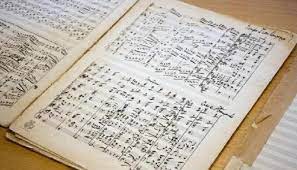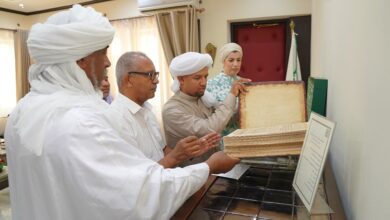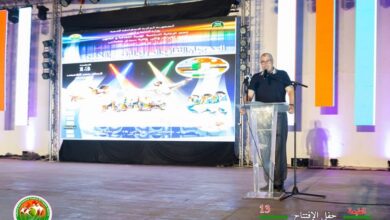The discovery of a rare manuscript from the book: “Roles in Music” – Al-Hiwar Al-Jazairia

It was composed in the seventh century AH
The King Abdulaziz Public Library in Riyadh revealed a rare copy of the manuscript of the book: “Roles in Music”, which is among its Arab and Islamic heritage holdings. He lived in Baghdad in the seventh century AH.
The manuscript, which probably dates from the second half of the tenth century and the first half of the eleventh century, begins; It has a date of review and review in the year 1058 AH.
It is a complete and newly bound copy that does not date back to the time of its writing, just as it was, according to the title paper, included in a collection of several books, of which this manuscript is considered the first.
Its author, Safi Al-Din, says:
“To proceed, the one whose commands I must obey and the right commanded me to strive in the goals of his thoughts, and he is our master, the king of the virtuous, the pride of the nobles, the sultan of the scholars, the crown of the ministers, the unique of his time, the judge of his time, and the only one of his time, Khawaja, the supporter of religion, truth, and religion, the cave of refugees and the qiblah of those who seek, Muhammad al-Tusi, may God be exalted is his eminence, and he enlightened in The rest of the horizons is his proof, that I put for him a summary in knowing the melody and the proportions of its dimensions and its roles, and the roles of rhythm and its types, on a method that benefits knowledge and action, so I hastened to comply with what he was commanded, and I showed, from what was allowed to the mind in it, if the beholder looked at it, what he did not notice would be revealed to him. Most of those who spent most of their time in this industry.
And its compiler Al-Armawi Al-Baghdadi adds at the beginning: “And I made its orbit first on one string so that the beginner would not be able to extract it, because the most difficult thing for those who intend to perform a work is the strings, and one string does not lack an accompaniment, as the accompaniment is the absolute ratio of one string to another, and its rank is five. ten chapters.”
And from what was stated in the layers of the roles: “And you can impose the first of the roles any tone you like, for example: If we want to make the first roles (b), for example, if we want the role of (lovers), then we impure (b), then (e), then (g), then (i), then (yib), then (yah), then (yo), then (yat) These aduras, in other than their places, are called “classes”, and the classes are seventeen in total, according to the number of tones.
It is mentioned that Safi Al-Din Al-Armawi Al-Baghdadi (613-693 AH) (1216-1294 AD) has two books: “The Book of Roles” and is considered one of the greatest books of Arabic music at the time of the end of the Abbasid Caliphate, and another book entitled: “The Honorable Message in Compositional Lineage.”
He was also famous for teaching many students in calligraphy and music, and wrote many theses.
His book Roles in Music is considered one of the most famous books in music because it is one of the first music books in Arabic in which the author detailed the melody, and made its basis based on (17) tones emerging from three types of minor dimensions. Seven types.
His author also looked at writing down the rhymes and their rhythms, and he used the Arabic letters to indicate the melody, and then linked them with the ouds to indicate the durations of their times in the rhythms’ turns.
The book has several manuscripts copied in the British Museum, the National Library of Austria, the University Library in Philadelphia, USA, and in the national libraries in Turkey, Baghdad and Cairo. The library keeps this rare manuscript that was written nearly five centuries ago.
#discovery #rare #manuscript #book #Roles #Music #AlHiwar #AlJazairia
#oussama_boulegheb #elhiwardz #alakhibariat.xyz #elhiwar #elhiwar-en



